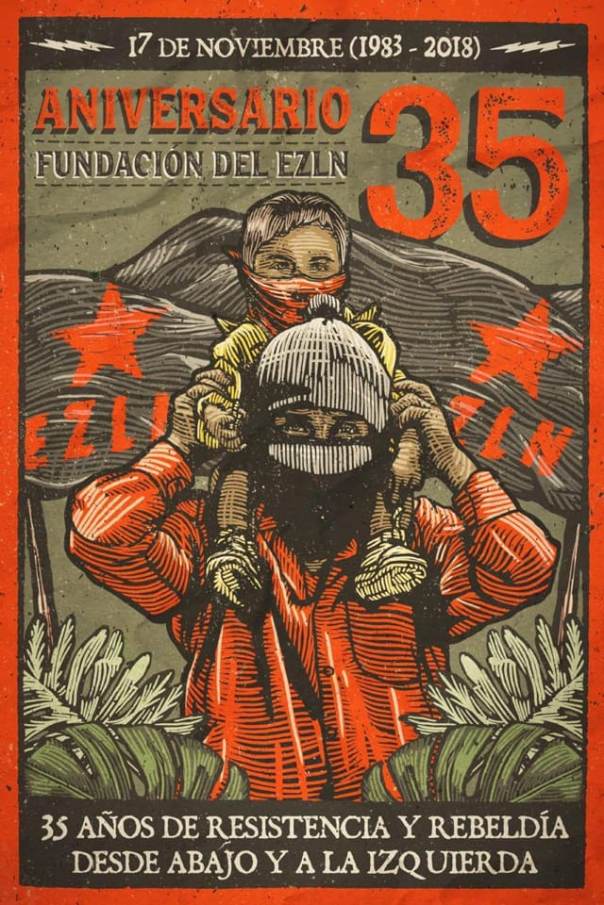
35th Anniversary of the EZLN’s Founding.
By: Raúl Zibechi.
“We are entering a new normal. Things are not like they were 10 years ago.” Phrases don’t belong to any intellectual, but rather to someone really important: the chief of a California county’s firefighters. They integrate the reporting of the Hispanic-American journalist Gustavo Arellano about the most recent and devastating fires, which can serve as an introduction to the chaotic world into which we are entering
The most experienced firefighters of that state assure that they had never seen anything like it. Some 10,000 buildings burned in the small city of Paradise, there were nearly 1,000 disappeared and the dead approached 100. Specialists assure that there is no longer a fire season, as there has been until now, because they happen throughout the year.
To climate change is added the disastrous urbanization of rural areas. One hundred million dead trees in California in only four years of draught (2011-2015), to which is added the brutal real estate speculation that has urbanized rural areas, an impressive “colonization of the countryside”.
Can we imagine what it would be like if hurricanes and tsunamis would stop being something exceptional or temporary to become “a new normal?” Add that most of the big cities of the southern world don’t have safe drinking water and their inhabitants have to buy it, when they can, so as not to get sick. The 20 million inhabitants of Delhi live 10 years less because of air pollution, 11 times higher than that permitted by the World Health Organization.
We are entering the moment in which the storm becomes daily, aggravated by a new political conjuncture in which the Trumps and the Bolsonaros form part of the new decoration. Even the mediocre French president Emmanuel Macron, declared that the world will be “doomed to chaos” if the decadent European Union doesn’t find a proper direction.
If it’s true, as the Brazilian philosopher Marcos Nobre says, that Bolsonaro was the candidate of the collapse and “needs the collapse to maintain himself,” we must reflect on this argument. In my view, the new conservatism (some call it “fascism”) as well as progressivism, are the bitter fruit of the collapse and have broad futures ahead. As was evident in Brazil, Lula and Bolsonaro are complementary and everyone will be able to reach similar conclusions in their own country. I believe it’s necessary to reflect on what we understand by collapse, those whom it will affect and how we could get out of it.
In the first place, making it clear that the collapse underway is a creation of those above, the dominant class or the richest one percent, to overcome a situation of extreme weakness due to a lack of legitimacy with respect to the rest of humanity. The collapse is a policy of above to control and discipline those below and, eventually, enclose them in real concentration camps, without wire fences but surrounded by fields with glyphosate, mono-crops, mega-projects and open pit mining.
I vehemently reject the idea that the collapse is a natural process or one of nature, and I insist on its character as a political project that reduces the planet’s population in order to stabilize the domination. This plan is also externalized in natural phenomena, but its starting point is the dominant class.
The second question is that it principally affects the popular sectors, native peoples, Africans liberated from slavery, rural families and the urban peripheries. Those of us below are superfluous in this world of accumulation by theft, because as has already been said we are the major obstacle to converting la nature into merchandise.
Those above attack us, but not because of ideological reasons, because of racism or femicidal machismo, but they use these instruments of domination and control to lubricate their illegitimate and often illegal enrichment. They turned violent to accumulate.
The third thing is that it doesn’t matter if these processes occur under conservative or progressive governments, since they cannot control accumulation by theft, which certainly does not convert them into innocents. South American progressivism has drowned because of the violence and corruption that the big megaprojects generated, more than because of the actions of the right.
As the leftist journalist Leonardo Sakamoto points out, the aberration of building a hydroelectric dam such as Belo Monte (in the middle of the Amazon), with its inevitable sequel of “violence against the indigenous populations, slave labor and human trafficking,” was the fruit of Lula’s developmental arrogance. Megaprojects are not “errors” but the core of progressivism.
Finally, this new reality disables our old strategies and forces us to build “arks” (or however each one wants to call the spaces of autonomy and self-defense) that we need to not shipwreck and die in the storm.
———————————————————–
Originally Published in Spanish by La Jornada
Friday, November 23, 2018
https://www.jornada.com.mx/2018/11/23/opinion/020a1pol
Re-Published with English interpretation by the Chiapas Support Committee
Pingback: Zapatista News & Analysis | Blog of Zapatista Support Group Wellington, Aotearoa/New Zealand
Pingback: EZLN warns Zapatistas will not permit ‘Maya Train’ mega Rail project – The Free